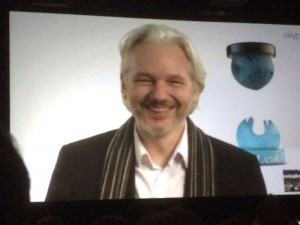 Almost everyone has heard of Julian Assange now, even if not many of them went to see the recent film about his life starring the increasingly ubiquitous Benedict Cumberbatch. So it’s no surprise there was a huge audience for Assange’s appearance in the first of a series of talks on security in the Internet age at this year’s SXSW Interactive festival in Austin, Texas. Assange was talking to Benjamin Palmer of Barbarian Group from his refuge in the Ecuadorian embassy in London. Over a troublesome Skype connection, prompting only partly humorous suggestions of NSA interference, he discussed the rise of the global information order and what he and others were doing to combat the situation.
Almost everyone has heard of Julian Assange now, even if not many of them went to see the recent film about his life starring the increasingly ubiquitous Benedict Cumberbatch. So it’s no surprise there was a huge audience for Assange’s appearance in the first of a series of talks on security in the Internet age at this year’s SXSW Interactive festival in Austin, Texas. Assange was talking to Benjamin Palmer of Barbarian Group from his refuge in the Ecuadorian embassy in London. Over a troublesome Skype connection, prompting only partly humorous suggestions of NSA interference, he discussed the rise of the global information order and what he and others were doing to combat the situation.
The suggestion of Skype interference wasn’t such a far-fetched idea, as the UK has purportedly spent $8 million keeping an eye on Assange during his de facto house arrest at the Ecuadorian embassy. Since its inception in 2006, Assange’s Wikileaks website has published several million government and government agency documents. It has uncovered many things that national authorities would rather have kept secret, claiming to be doing so as an antidote to abuse. In the SXSW interview, Assange predicted a time fast approaching when governmental surveillance of citizens would be nearly perfect, and wondered how the Internet, the greatest tool of human emancipation, had been co-opted as the greatest tool of state surveillance instead. “We are moving into a new totalitarian world — not in the Stalinist sense, but total surveillance,” he argues.
 “This steady rise of surveillance has been going on without us paying much attention. But the Edward Snowden revelations changed all this, and revealed the NSA to be a rogue agency acting without oversight by civilian government, gobbling up Internet information without constraint.” In fact, the NSA pretended it did not exist, prompting some to joke that its three letters stood for ‘No Such Agency‘. “The NSA always had a policy not to respond to media reports, and as a result didn’t have a PR strategy, making them a rather different opponent to Wikileaks’s main adversary, the Pentagon, which has a sophisticated and well oiled media machine.”
“This steady rise of surveillance has been going on without us paying much attention. But the Edward Snowden revelations changed all this, and revealed the NSA to be a rogue agency acting without oversight by civilian government, gobbling up Internet information without constraint.” In fact, the NSA pretended it did not exist, prompting some to joke that its three letters stood for ‘No Such Agency‘. “The NSA always had a policy not to respond to media reports, and as a result didn’t have a PR strategy, making them a rather different opponent to Wikileaks’s main adversary, the Pentagon, which has a sophisticated and well oiled media machine.”
According to Assange, this has led to the Internet becoming a political space, with its own political refugees. Glenn Greenwald has left his US home to live in Brazil, Assange himself is in the Ecuadorian embassy, Edward Snowden is in Russia, and Tor project founder Jacob Appelbaum is also in Berlin. On a more positive note, this has created new strongholds outside the reaches of the USA, with Brazil in particular concerned about the interference of the NSA beyond US borders. Assange still finds himself able to work from the Ecuadorian embassy, despite the constraints, and the other journalists have been able to continue their activities abroad as well.
Assange sees Wikileaks’ uncovering of injustice as a protection against its effects. Security agencies “can’t just ‘go dark’ and stop recording their activities, as this is a necessity for the mechanisms of power.” So their more nefarious activities will always be vulnerable to being revealed, much as the Holocaust was exposed in part by the bureaucratic documentation that managed it. Over the last decade, he believes that human society and the Internet have merged, so that the laws of both apply to each other. In other words, the penetration of the Internet by the NSA is a military occupation of civilian space.
 However, Assange is concerned that we are still in a situation where the military and security communities take precedence over the civilian administration. He points out that nothing has been done since the Edward Snowden revelations, despite the media being broadly behind some constraint being put on the powers of the NSA. He alleges that this shows that the Obama administration is not taking the issues seriously, and illustrates the power of what he calls the ‘Deep State’, meaning the military agencies and their contractors. He isn’t surprised by this, however, claiming that if Obama said “I’m going to disband the NSA”, or the CIA, he would “most likely be impeached thanks to some newly discovered evidence.” He cites the demise of General David Petraeus after FBI allegations as a case in point.
However, Assange is concerned that we are still in a situation where the military and security communities take precedence over the civilian administration. He points out that nothing has been done since the Edward Snowden revelations, despite the media being broadly behind some constraint being put on the powers of the NSA. He alleges that this shows that the Obama administration is not taking the issues seriously, and illustrates the power of what he calls the ‘Deep State’, meaning the military agencies and their contractors. He isn’t surprised by this, however, claiming that if Obama said “I’m going to disband the NSA”, or the CIA, he would “most likely be impeached thanks to some newly discovered evidence.” He cites the demise of General David Petraeus after FBI allegations as a case in point.
It’s a depressing idea that there could be no proper civilian power reining in these agencies, because they have budgets of the order of tens to hundreds of billions of dollars to protect their interests. Assange claims this realisation is what led Paypal’s Pierre Olmidyar to fund a new journalism venture involving Glenn Greenwald and Laura Poitras. Even with Olmidyar’s purported $8 billion worth, Assange argues that “if you’re not part of the military intelligence system you’re still not safe. The separation between money and power means that money alone doesn’t get you power.” Assange seemed positive about Olmidyar’s foray into journalism, which is perhaps surprising after Paypal’s 2010 withdrawal of its services for Wikileaks’s donations.
 In fact, Assange seems generally positive about his situation. Arguing that “power groups don’t need power, they just need the perception of power to rule”, he boasts that although the Pentagon had asked Wikileaks to destroy all past and future documents, the site’s refusal to do so has not led to its demise. “Wikileaks wasn’t destroyed,” he added. “We try, test, and push against the appearance of threat to see what the reality is. We’re still in the black. We haven’t had to fire anyone.”
In fact, Assange seems generally positive about his situation. Arguing that “power groups don’t need power, they just need the perception of power to rule”, he boasts that although the Pentagon had asked Wikileaks to destroy all past and future documents, the site’s refusal to do so has not led to its demise. “Wikileaks wasn’t destroyed,” he added. “We try, test, and push against the appearance of threat to see what the reality is. We’re still in the black. We haven’t had to fire anyone.”
Assange is bullish about the future. “Less than one per cent of the alleged Edward Snowden material has been made public, and 10 to 15 per cent of State Department documents released,” he explains. “Documents from the CIA, GCHQ, the Chinese Public Security Bureau, and the FSB need to be released.” Despite being holed up in the Ecuadorian Embassy since the middle of 2012, he remains stalwart about continuing his crusade. “Courage is seeing fear and still proceeding anyway,” he argues. Whether you see Julian Assange and his Wikileaks site as a brave protector of public interests, or a grave threat to national security, the controversy that the site creates is clearly far from over.
This article originally appeared in ITProPortal.
Related Posts







